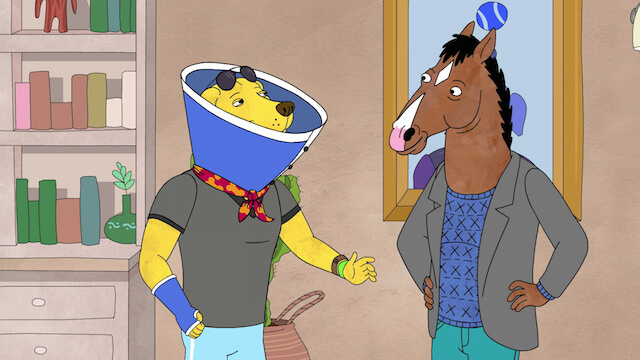‘BoJack Horseman’ The first season of the Netflix toon “BoJack Horseman” — following a sentient, and therefore perhaps inevitably self-loathing, alkie horse (voice of Will Arnett) — was a slow burn. It started off in the “Family Guy” vein (though far funnier/wittier/cleverer), with familiar potshots at Hollywood as well as copious animal-related sight gags. Then it got weirder. Then it got sadder. Then it got sadder still. But still funny! And also weirder still! By the end its 12 episodes had become a six-hour plunge into despair, not just dark but frank, with the kind of tough love insights that make one want to grab one of the stiff drinks its antihero regularly pours down his long neck. (It’s worth noting that, upon multiple revisits, the anguish is there from the get-go. It just isn’t obvious on first spin.) The second season begins with the show’s true, miserable-funny identity already established, except for one thing: our lead is no longer so miserable. The washed-up has-been star of one of those cheesy ’80s family sitcoms, BoJack spent the first season attempting a comeback via a memoir, which, thanks to ghost writer/love interest/human Diane Nguyen (Alison Brie), turned into a partly loving expose rather than a fawning paean. He wound up with success anyway, and his dream gig: playing famous equine Secretariat, who had been repurposed as a tragic figure in the Pete Rose vein, only with a far more despairing end. RELATED: Our interview with “BoJack Horseman” voice star Amy Sedaris When the second season starts, BoJack is in higher spirits — vertiginously higher spirits. Instead of booze and the previous night’s dinner, he’s vomiting up Successories phrases and spoken IRL hashtags. He’s even matching obliviously happy rival/dog Mr. Peanutbutter (Paul F. Tompkins) pep for pep. The crunchy vibes can’t last, but the new 12 episodes aren’t a plummet but rather hills and valleys. Good things do happen to him: He slightly sobers up, he gets a girlfriend — a TV exec/owl (Lisa Kudrow), fresh out of a 30-year coma — and stops pestering on-again-off-again f— buddy/agent/cat Princess Carolyn (Amy Sedaris). He also realizes that a decade-plus of bland sitcom work may have destroyed his serious acting chops, relentlessly questions and sabotages his new, healthy relationship and still pines for The One That Got Away: a fawn from his past, voiced by Olivia Wilde, who was last seen in a drug-fueled fantasy that proved to be the last season’s most idyllic and gut-wrenching passage. This season thus becomes an exploration of how hard it is to be good, and how hard it is to keep your dreams from crumbling, even as you seem to be in the middle of achieving them. The emphasis isn’t strictly on BoJack. Diane, Princess Carolyn, Mr. Peanutbutter and BoJack’s eternal sorta-roommate/manchild Todd (Aaron Paul) all go through the same hills and valleys. Sometimes they’re the saboteurs of their own destruction. Sometimes it’s outside figures who do the deed. Two separate episodes end with everything that’s transpired abruptly undone by a supporting figure, in one case BoJack simply throwing his money and fame around to fix everything as everyone else remarks about how little difference they made. The candy-colored, talking animal-strewn world of “BoJack Horseman” is a harsh and unforgiving place, where dreams are regularly shattered and characters fail to circumvent their own nature. “You can’t escape you,” one character declaims in a latter episode. Human or anthropomorphized non-human, the characters in “BoJack Horseman” are locked in an everlasting battle between nature vs. nurture, which often ends with deep-seated problems trumping attempts at true change. RELATED: Our piece on the first season of “BoJack Horseman” Here’s the part where we tell you all this depressingly downer business is also gut-bustingly funny. The second seasons rarely hits the dizzyingly manic heights of the first at its craziest, namely “Live Fast, Die Nguyen” (where Diane visits her Bah-ston stereotype family), “One Trick Pony” (charting the unmaking of a Mr. Peanutbutter movie, starring BoJack as his arch-nemesis and Wallace Shawn as BoJack) and especially “Downer Ending,” the drug-crazed penultimate episode that makes room for homages to “Duck Amuck” and “Akira.” “Let’s Find Out,” which arrives around the second’s midpoint, comes close, with a bananas game show produced by no less than a presumed dead literary agent, whose identity we won’t give away. (Ditto a celebrity guest so big we had to check the credits to make sure it’s really him or her.) There’s also “Chickens,” which riffs on an idea from Douglas Adams’ “The Restaurant at the End of the Universe” to explain why, in a world partly populated by self-aware chickens, people would still eat chicken. If “BoJack 2” is not always as funny as “BoJack 1” — which is to say it’s still really, really, super-mega-ultra-funny — it still offers an even more mature, deeper and more sobering stare into the abyss. At times it seems like the second season may work out fine for its cast — that they’ve got their stuff together, finally, and are just on the rocky road to true happiness. Then things suddenly stop working well, and even a last-ditch attempt on BoJack’s part to make amends ends more disastrously than one would expect, if perhaps not in the way one would expect. The only option is to keep chooglin’, to keep trying to make things better. Such is life, even in a world where three children stacked on top of each other underneath a trenchcoat are able to pass themselves off as a man who works in a business factory for far longer than they should have.
Season 2
Netflix Instant
‘BoJack Horseman”s second season less loopy, more sad #BoJackThoughts

Netflix
Follow Matt Prigge on Twitter @mattprigge


















